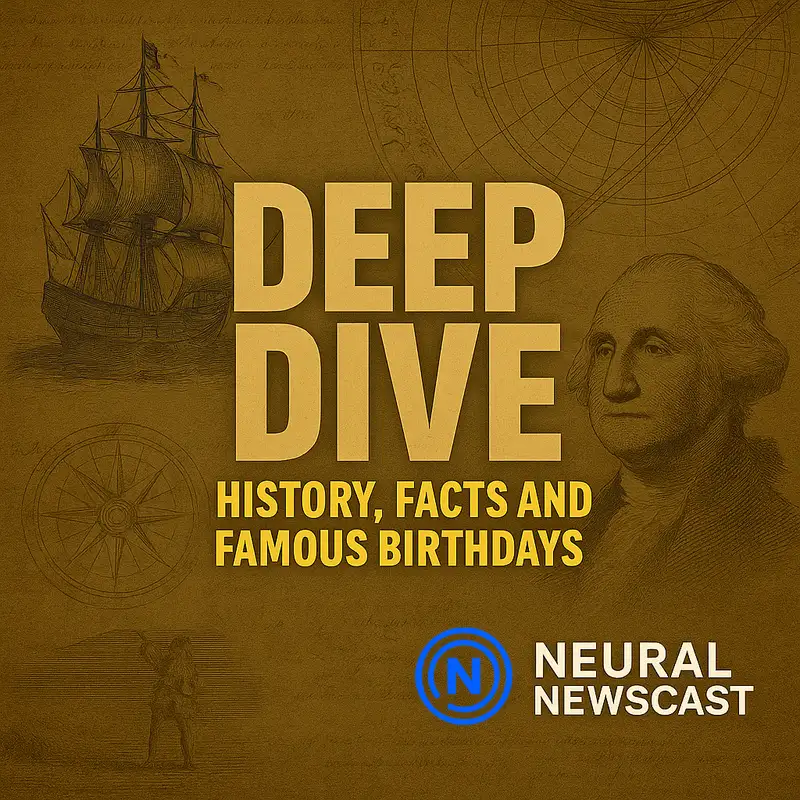Deep Dive: 1985's Turning Point, Gandhi’s Tactics, and the First US CD: A Deep Dive - October 2, 2025
AI delivers it fast.
Humans ensure it's right.
This is Neural Newscast.
Thanks for joining us for this Neural Newscast deep dive.
I'm Lydia, your entertainment correspondent,
and alongside Abigail, your literature reporter,
we're about to uncover some intriguing stories.
On this day in 1985, a major historical moment
reshaped the conversation.
The phrase sounds compact, but it carries
the weight of everything that followed, doesn't it?
It does. 1985 crystallized a turning point.
When you look at how culture and literature respond,
you hear the echoes for years afterward.
Exactly. From my entertainment beat,
that day became a lens for celebrity and media to reinterpret identity and power.
The aftermath rippled through headlines and the broader industry.
In print, writers reached for new metaphors to make sense of it.
One moment generated a vocabulary for trauma, resilience, and reinvention that novelists and critics kept returning to.
And the media machinery adjusted.
Gatekeepers and platforms changed how they framed stories because of the scrutiny that moment demanded.
Publishers and literary journals mirrored that shift.
making room for voices shaped by its implications
and for questions that suddenly felt urgent.
There was the fascination factor, too.
Audiences wanted narratives that explained, humanized, or dramatized what happened.
And that demand steered both reportage and artistic portrayals.
Those portrayals then fed back into public understanding.
creating a feedback loop where fiction and nonfiction together
reframed the moment across generations.
It's striking how a single date becomes an anchor for so many cultural conversations,
shaping celebrity narratives, media practice, and our shared memory.
Absolutely. And its significance endures because writers and commentators still probe
its meanings, mining it for insight into our collective story.
Time for a quick pause.
We'll explore more when Neural Newscast deep dive returns.
From turning points to the people who shaped them,
today we celebrate the birthdays of Mahatma Gandhi, 1869,
Graham Green, 1904, and Groucho Marx, 1890.
That's quite a trio. Political leadership, literary gravity, and theatrical comedy.
Let's take a deeper look at Mahatma Gandhi, 1869, as you suggested.
Gandhi's life reads like a study in how personal practice and political strategy intertwine.
His unwavering commitment to nonviolent resistance reshaped an independence movement
and inspired many beyond India.
What's compelling is how his methods were as much ethical as tactical.
Civil disobedience framed as moral witness, not merely protest.
That gave ordinary people a philosophical as well as political rationale to act.
And that moral framing amplified his reach.
Followers weren't just backing a leader,
they were embracing a disciplined practice of nonviolence
that changed what dissent looked like on the global stage.
There's a lesser-known texture too. His techniques were iterative and experimental.
Over decades he refined methods, testing how symbolic acts, marches, fasts,
could sway public conscience as much as policy.
He made resistance visual and narrative-driven.
The Salt March, for example, worked as both practical protest and a storytelling device that crystallized grievances into a single shareable image.
Those images carried meaning beyond immediate political goals.
They communicated dignity and self-rule, which is why movements far from India later cited his influence in civil rights and decolonization.
I often point to what that modeled, restraint and moral clarity with real strategic effect.
His influence rippled into global movements for justice and equality, making him a durable symbol of hope and resilience.
And the private dimension surprises people.
He wasn't a distant icon.
Rigorous spiritual practice and personal austerity, along with contradictions,
makes studying him intellectually rich and sometimes uncomfortable.
Those contradictions, his experiments with truth, communal living, and strict disciplines,
make him more human, not less legendary.
They help explain why his example still sparks debate and inspiration.
From a cultural historical standpoint, his legacy persists because nonviolence remains a viable tactic for marginalized groups.
He taught later generations that moral creativity can be a form of political power.
Exactly. Today we remember Gandhi not just for a single victory, but for establishing a language and toolkit for resistance that still informs struggles for justice worldwide.
And that continued relevance may be the best summation.
His life and achievements shaped the world we inhabit,
offering both a strategy and a moral vocabulary
that movements still draw upon.
Stay with us.
More deep dive exploring coming up.
You are listening to NNC, Neural Newscast.
Subscribe and listen wherever you choose,
and be sure to listen to our archive for more content like this episode,
published daily at nnewscast.com.
Welcome back to Neural Newscast's deep dive.
For our Fact of the Day, let's pivot to music and technology.
Fact of the Day, the first CD pressed in the US was Bruce Springsteen's Born in the USA.
That single detail carries a lot of cultural weight.
Springsteen, a quintessential American voice,
marking the inaugural U.S. pressing.
Exactly.
There's an almost poetic symmetry,
a new format arriving alongside one of the most iconic American albums.
It invites you to consider how music and technology converge to shape cultural memory.
That album launching the format here feels symbolic.
For listeners and collectors, the detail adds historical significance to the album itself beyond the songs.
And those format firsts can anchor our perception of a work's importance,
simply by being first in a new medium.
Right. The first status makes the record part of the story of the CD era in the US,
not just part of Springsteen's discography.
It gives scholars and fans a clear reference point for tracing how music consumption evolved,
an emblematic data point.
And for pop culture storytellers, it's a neat through line.
a major American artist marking the physical dawn of a new listening experience.
That interplay, artist significance, and technological milestone
is exactly what makes cultural history so fascinating.
That's all for this Neural Newscast deep dive.
On behalf of Lydia and me, Abigail, thanks for listening.
You have been listening to NNC.
Visit nnewscast.com for more episodes and deep dives.
Neural Newscast fuses real and AI-generated voices for fast quality news.
AI creates humans review.
We aim for accuracy, but errors can happen.
Verify key details.
Learn more at NNewscast.com.
Creators and Guests


